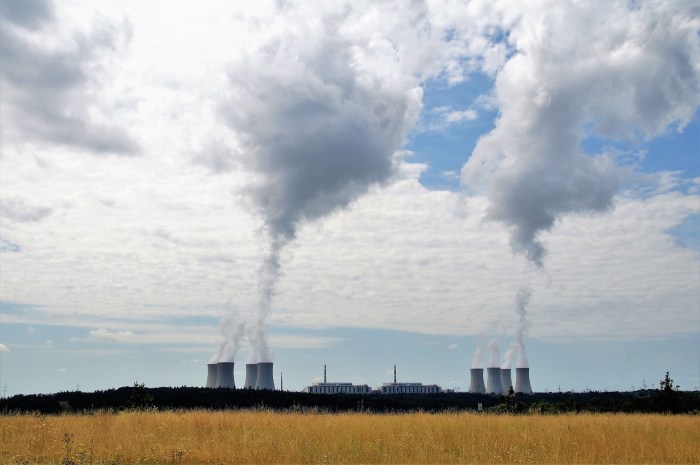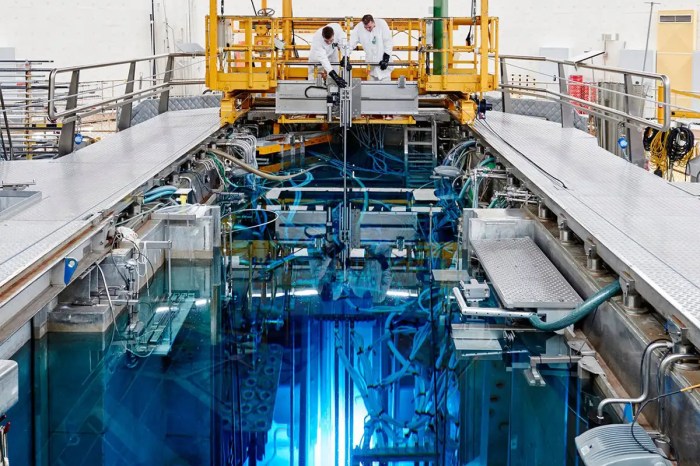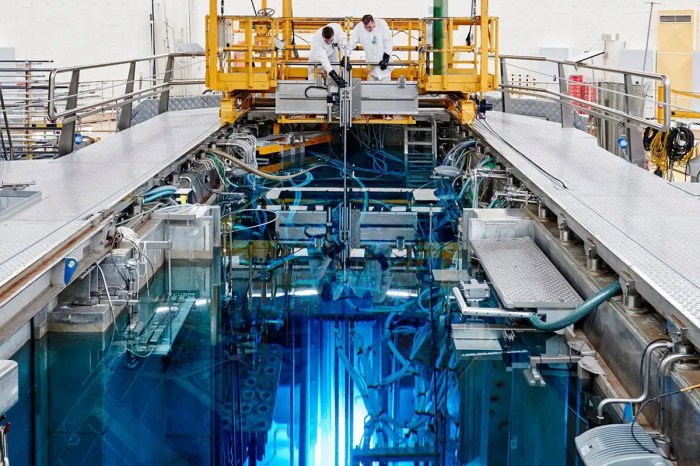Swiss startup nuclear energy thorium – Swiss Startup Nuclear Energy: Thorium’s Potential – it’s a phrase that might sound like something out of a science fiction novel, but it’s a very real and exciting development in the world of energy. Switzerland, known for its clean energy initiatives and reliance on nuclear power, is now embracing the possibilities of thorium as a fuel source.
This small but innovative nation is seeing a surge in startups dedicated to harnessing the power of thorium, and the implications for the future of energy are truly remarkable.
Thorium is a naturally occurring radioactive element that offers several advantages over uranium, the traditional fuel source for nuclear power. It’s more abundant, produces less radioactive waste, and has a lower risk of nuclear proliferation. These factors make thorium a highly attractive alternative for a sustainable energy future.
Swiss startups are at the forefront of this revolution, developing cutting-edge technologies for thorium reactor designs, fuel processing, and waste management. Their innovations are not only shaping the energy landscape of Switzerland but also paving the way for a global shift towards thorium-based nuclear power.
Introduction to Thorium in Switzerland
Switzerland is a country known for its stunning landscapes, high quality of life, and commitment to sustainability. However, the country also relies heavily on nuclear power, with four operational nuclear power plants contributing significantly to its energy mix. This dependence on nuclear power has led to ongoing discussions about the future of nuclear energy in Switzerland and the potential of alternative fuel sources, like thorium.
The Current State of Nuclear Power in Switzerland
Switzerland’s nuclear power plants have played a crucial role in its energy security and carbon-free electricity generation. However, the country’s nuclear power program faces significant challenges, including:
- The aging infrastructure of existing nuclear power plants, requiring significant investment in upgrades and maintenance.
- Public concerns about the safety and long-term storage of nuclear waste.
- The phasing out of nuclear power in neighboring countries, creating uncertainties in the future supply of nuclear fuel.
These challenges have led to a debate in Switzerland about the future of nuclear power. While some advocate for continued operation of existing plants, others call for a gradual phase-out and a shift towards renewable energy sources. The Swiss government has adopted a cautious approach, with a focus on extending the lifespan of existing plants while also investing in renewable energy technologies.
Thorium as a Potential Fuel Source for Switzerland
Thorium is a naturally occurring radioactive element that has emerged as a promising alternative to uranium as a nuclear fuel source. Thorium offers several advantages over uranium, including:
- Abundance: Thorium is significantly more abundant than uranium, with estimates suggesting that it could provide enough energy for thousands of years.
- Safety: Thorium-based reactors are considered inherently safer than uranium-based reactors, with a lower risk of meltdowns and the production of less radioactive waste.
- Proliferation Resistance: Thorium reactors are less susceptible to the production of weapons-grade plutonium, making them less attractive for nuclear weapons proliferation.
- Waste Management: Thorium reactors produce less radioactive waste than uranium reactors, and the waste has a shorter half-life, making it easier to manage.
These advantages have led to renewed interest in thorium as a potential fuel source for Switzerland.
Swiss Startups in the Thorium Energy Sector: Swiss Startup Nuclear Energy Thorium
Switzerland, known for its innovation and commitment to clean energy, has a growing number of startups actively pursuing thorium-based nuclear energy technologies. These startups are exploring various aspects of thorium energy, from reactor design and fuel processing to waste management, contributing to a potential shift in the Swiss energy landscape.
Prominent Swiss Startups in the Thorium Energy Sector
These startups are leading the way in developing innovative thorium energy technologies.
- Thorium Energy Switzerland (TES):TES is a prominent startup focused on developing a molten salt reactor (MSR) design specifically tailored for thorium fuel. Their MSR design emphasizes safety and efficiency, aiming to minimize waste and maximize energy output. TES is currently in the research and development phase, collaborating with universities and research institutions to refine their reactor design and assess its feasibility.
- Thorium Fuel Technologies (TFT):TFT specializes in developing advanced fuel processing technologies for thorium-based nuclear reactors. Their expertise lies in converting thorium into usable fuel forms, such as thorium dioxide, and developing methods for efficient fuel reprocessing. TFT is collaborating with international partners to validate their fuel processing technologies and ensure their compatibility with different reactor designs.
- Swiss Thorium Waste Management (STWM):STWM focuses on developing innovative solutions for the safe and efficient management of thorium-based nuclear waste. Their research explores methods for reducing the volume and radioactivity of thorium waste, aiming to minimize the long-term environmental impact of thorium energy. STWM is collaborating with nuclear waste management experts to develop sustainable solutions for thorium waste disposal.
Technological Advancements and Innovations

Switzerland is at the forefront of innovation in the field of thorium nuclear energy. Swiss startups are actively developing new reactor designs and technologies that aim to overcome the challenges associated with traditional uranium-based reactors, paving the way for a more sustainable and efficient energy future.
Thorium Reactor Designs, Swiss startup nuclear energy thorium
The key technological advancements in thorium reactor designs being developed by Swiss startups are focused on improving fuel cycle efficiency, waste management, and reactor safety.
- Molten Salt Reactors (MSRs):These reactors operate at high temperatures using a molten salt mixture containing thorium as fuel. The molten salt acts as both the coolant and the fuel, eliminating the need for a separate cooling system. This design offers several advantages, including:
- High Thermal Efficiency:MSRs can operate at higher temperatures than traditional reactors, leading to greater energy efficiency.
- Inherent Safety Features:The molten salt fuel is inherently safer than solid fuel rods. In case of an accident, the salt would simply drain into a safe storage container, preventing a meltdown.
- Improved Waste Management:MSRs produce less radioactive waste and the waste is easier to manage than that from traditional reactors.
- Fluidized Bed Reactors (FBRs):FBRs use a fluidized bed of thorium fuel particles suspended in a gas stream. This design offers several advantages, including:
- High Fuel Utilization:FBRs can utilize a higher percentage of thorium fuel than traditional reactors, reducing the amount of waste produced.
- Enhanced Safety:The fluidized bed design provides inherent safety features, such as the ability to automatically shut down the reactor in case of an accident.
Fuel Cycle Efficiency
Swiss startups are developing innovative fuel cycle technologies to enhance the efficiency of thorium utilization. These technologies focus on:
- Thorium Fuel Processing:Efficient and cost-effective methods for processing thorium fuel are being developed to extract and purify thorium from its natural sources.
- Fuel Breeding:Thorium reactors have the potential to breed more fuel than they consume, leading to a sustainable energy source. Swiss startups are working on technologies to optimize the breeding process.
Waste Management
Thorium reactors produce significantly less radioactive waste than traditional reactors. Swiss startups are developing technologies to further minimize waste production and ensure safe and efficient waste management. These technologies include:
- Transmutation:This process involves converting long-lived radioactive waste into shorter-lived or stable isotopes, reducing the overall radioactive hazard.
- Waste Immobilization:Swiss startups are developing innovative methods for immobilizing radioactive waste in a stable and safe form, suitable for long-term storage.
Potential Benefits for Switzerland
These technological advancements have the potential to significantly benefit Switzerland’s energy independence and sustainability.
Explore the different advantages of fourth fastest supercomputer on earth is a quantum ready juggernaut from france that can change the way you view this issue.
- Reduced Reliance on Imported Fuels:Thorium is a more abundant resource than uranium, and Switzerland has access to thorium reserves. This would reduce the country’s dependence on imported fuels.
- Enhanced Energy Security:Thorium reactors offer inherent safety features, reducing the risk of accidents and ensuring a more reliable energy supply.
- Environmental Sustainability:Thorium reactors produce less radioactive waste and have a lower carbon footprint than traditional reactors, contributing to a cleaner and more sustainable energy future for Switzerland.
Economic and Societal Implications
Thorium energy, with its potential for safe, clean, and abundant energy generation, presents both economic and societal opportunities for Switzerland. Analyzing the economic potential and societal implications of thorium deployment in Switzerland is crucial to understanding its long-term impact on the country’s energy landscape.
Economic Potential of Thorium Energy
The economic potential of thorium energy for Switzerland is significant. Thorium offers a robust energy source with the potential to create new jobs, attract investments, and position Switzerland as a leader in advanced nuclear technology.
- Job Creation:The development and deployment of thorium reactors would create new jobs in various sectors, including mining, engineering, construction, and operation and maintenance. This would stimulate the Swiss economy and contribute to a more diversified workforce.
- Investment Opportunities:Thorium energy presents attractive investment opportunities for both private and public sectors. The development of thorium technology would attract foreign investment, boosting the Swiss economy and creating new research and development opportunities.
- Technological Leadership:By investing in thorium technology, Switzerland could establish itself as a leader in advanced nuclear energy. This would enhance its international reputation and attract global talent, strengthening its position as a hub for technological innovation.
Societal Impacts of Thorium Deployment
The societal impacts of thorium deployment in Switzerland are multifaceted, encompassing public perception, environmental concerns, and regulatory frameworks.
- Public Perception:Public acceptance of thorium energy is crucial for its successful implementation. Addressing public concerns about nuclear safety, waste management, and potential risks is vital. This can be achieved through transparent communication, public education campaigns, and engagement with stakeholders.
- Environmental Concerns:Thorium energy offers significant environmental advantages compared to traditional uranium-based nuclear power. Thorium reactors produce less radioactive waste, have a lower risk of proliferation, and require less stringent security measures. However, addressing potential environmental impacts, such as the mining of thorium and the disposal of waste, is essential for public acceptance.
- Regulatory Frameworks:Establishing robust regulatory frameworks for thorium energy is essential for ensuring safety, security, and responsible deployment. This includes developing clear guidelines for licensing, operation, and waste management, as well as ensuring adequate oversight and enforcement.
Comparison with Traditional Uranium-Based Nuclear Power
Thorium energy offers distinct advantages over traditional uranium-based nuclear power in terms of both economic and societal implications.
- Economic Advantages:Thorium is more abundant than uranium, reducing reliance on foreign imports and potentially lowering energy costs. Thorium reactors are also more efficient and require less fuel, further reducing costs and increasing energy output.
- Societal Advantages:Thorium reactors produce significantly less radioactive waste, reducing the risks associated with waste disposal and long-term storage. They also have a lower risk of nuclear proliferation, making them a more attractive option for countries seeking to develop their nuclear energy programs.
Future Prospects and Challenges

Swiss startups in the thorium energy sector face both significant challenges and exciting opportunities. The potential of thorium as a clean and sustainable energy source is undeniable, but realizing this potential requires navigating a complex regulatory landscape, overcoming technological hurdles, and securing the necessary funding.
Regulatory Landscape and Its Impact on Startup Development
The regulatory landscape for thorium energy in Switzerland is still evolving. While the country has a long history of nuclear energy, the focus has been on traditional uranium-based reactors. The development of thorium-based technologies necessitates a comprehensive regulatory framework that addresses the unique characteristics of thorium and ensures safety and environmental protection.
- Licensing and Permitting:The process for obtaining licenses and permits for thorium-based projects will likely require specific regulations tailored to the technology. Startups will need to navigate this process, demonstrating compliance with safety standards and environmental regulations.
- Public Perception and Acceptance:Public perception of nuclear energy, including thorium, remains a significant factor. Startups will need to actively engage with the public, addressing concerns and promoting the benefits of thorium-based energy.
- International Collaboration:Switzerland can benefit from international collaboration on thorium research and development. Startups can leverage partnerships with research institutions and companies in other countries to accelerate progress.
The Role of Swiss Startups in the Global Transition to Thorium-Based Nuclear Energy
Swiss startups have the potential to play a pivotal role in the global transition towards thorium-based nuclear energy. Their agility, innovation, and expertise in clean technologies can contribute to the development and deployment of thorium reactors and fuel cycles.
- Technological Innovation:Startups can focus on developing innovative technologies for thorium fuel processing, reactor design, and waste management. This includes advancements in molten salt reactors (MSRs), which are considered particularly promising for thorium utilization.
- Commercialization:Startups can play a key role in commercializing thorium technologies, bringing them to market and making them accessible to a wider range of applications.
- Global Partnerships:Swiss startups can collaborate with international partners, sharing knowledge and expertise to accelerate the global adoption of thorium energy.
Challenges and Opportunities for Swiss Startups
Swiss startups in the thorium energy sector face a number of challenges, but also have the opportunity to make a significant contribution to the global energy landscape.
- Funding:Securing sufficient funding for research, development, and commercialization is a major challenge. Startups will need to attract investors who are willing to take a long-term view on the potential of thorium energy.
- Technical Expertise:Building a skilled workforce with expertise in thorium technology is crucial. Startups will need to invest in training and education to develop the necessary skills.
- Market Demand:The current market for thorium energy is limited. Startups will need to create demand for their technologies by demonstrating their viability and economic competitiveness.


